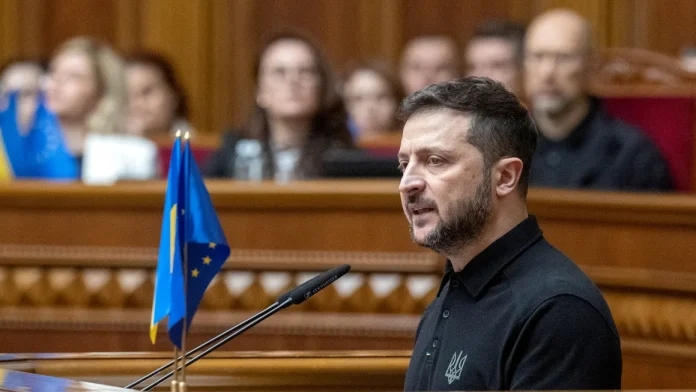Ukraine is about to be sold off. If that statement sounds too harsh and convincing, consider the evidence: The Russians occupy one-fifth of its territory, and all the efforts of the Ukrainians have failed to drive out these invaders. Vladimir Putin’s army is acquiring increasingly sophisticated weapons, while the Ukrainians are struggling to maintain their own forces, Bloomberg reports.
Moreover, economically and energy-starved European countries are desperate for an end to the fighting on any terms other than Ukraine’s absolute surrender. If Donald Trump comes to power in the US, the general consensus, given his declared enthusiasm for Putin, is that the Ukrainians are finished. Even if Kamala Harris gets into the White House, it is likely that she will push for an end to the war because Washington does not see a victory scenario for Ukraine, despite sending $175 billion in US aid.
Escalating conflicts in the Middle East have diverted attention away from Ukraine, with tragic consequences for President Volodymyr Zelensky’s people. Fewer and fewer US weapons are available for delivery to Kyiv, and the eyes of Western governments are fixed mainly on Israel and Iran, even as Russian troops advance.
If these are the headlines, let’s look at some of the details. Russia is acquiring more effective weapons. The Russians are reported to have established a factory in China to build Garpiya-3 attack drones using Chinese expertise, according to Bloomberg.
Ukrainians are outraged that the Russians appear to be using Starlink’s illegal internet connections to enhance their surveillance and control capabilities. Although Elon Musk denies assisting Russia in this way, Ukrainians are deeply suspicious.
Russian bombing of Ukrainian energy infrastructure is devastating. This winter, many residents of Zelensky will be left without light and heat, which will be a serious blow to morale. The US refuses to allow Ukraine to use American weapons to retaliate.
As for foreign support, President Zelensky’s tour of Europe earlier this month to promote his so-called “Victory Plan” provided favourable rhetoric, but nothing more. The new head of NATO, former Dutch Prime Minister Mark Rutte, told reporters, “Supporting Ukraine in the fight with Russia is crucial for our collective security.” This is absolutely true. Privately, however, European countries are desperate to revive the old regime of cheap energy that depends on Russian oil and gas, Bloomberg reports.
The flow of European munitions to Ukraine, which was never strong, has now slowed to a trickle, not least because of sluggish production rates, which are not much better in the US. Economic sanctions against Russia remain highly impenetrable because of the West’s lack of will to enforce them.
In Ukraine itself, after nearly three years during which it was considered treasonous to talk of any acceptable outcome to the war other than victory and the expulsion of the Russians from Donbas, many people are now talking about negotiations. They recognise that it is unlikely to succeed in depriving Putin’s forces of their gains, which continue to grow.
This summer, the Ukrainians made a surprise incursion into Russia’s Kursk region, where, after occupying a territory of several hundred square miles, they met little resistance. It was seen as a blow to Putin’s prestige. However, the operation turned out to go nowhere. The attack may have contributed to Putin’s campaign to portray the war to the Russian people as NATO aggression against their homeland.
Now, as Ukraine and Russia approach winter, few can doubt that 2024 has been a successful year for Putin and a sad and difficult one for Zelensky. The latter said in Croatia a fortnight ago:
“Weakness of any of our allies will inspire Putin. That’s why we’re asking [the allies] to strengthen us, in terms of security guarantees, in terms of weapons, in terms of our future after this war. In my view [Putin] only understands force.”
Zelensky is right. But it is becoming increasingly difficult to persuade foreign political leaders and their nations, preoccupied with their own problems and frankly bored with Ukraine, to support a course of action that may require sacrifices at home.
One American strategy guru astutely predicted in the first summer of the war that while the Russians might not be able to conquer Ukraine, they could keep it in such a state that no sane person would want to live or invest in it. That is a realistic prospect. The 7 million Ukrainians who have left their country since February 2022 have little or no desire to return. Ukraine’s economy is tanking, according to Bloomberg.
The best guarantee of Ukraine’s security would be NATO membership. However, this remains unlikely. Putin would reject any settlement or even a ceasefire that includes such a provision. The US is wary of such a commitment. The Germans and perhaps other European members would veto it.
It is obvious and right that the Ukrainians will reject any deal that does not offer them a Western military guarantee in the event of renewed military conflict. But such an agreement would have to be individualised. It may also prove difficult to get the Russians to agree to any deal that includes the possibility of Ukrainian membership in the European Union.
The West has suffered a glaring failure of leadership. The only people who can argue that the best hours have been learnt from the war in Ukraine are the Ukrainians. Their allies are proving that they have neither the steel nor the stamina for a protracted conflict. Some analysts take solace in the fact that the West has so far supported Ukraine and made Putin pay a high price for very limited success.
Analysts believe that Putin’s conviction that the West is decadent and divided, and therefore vulnerable, is well-founded.
